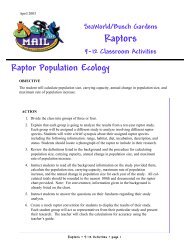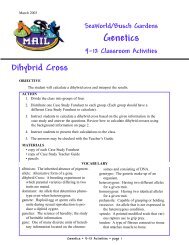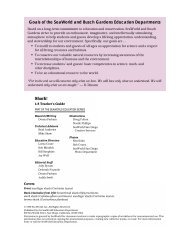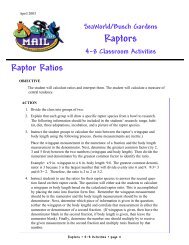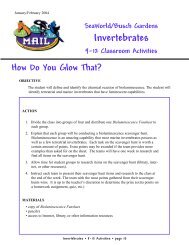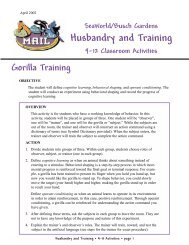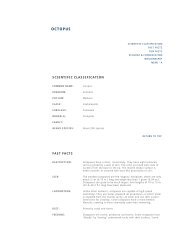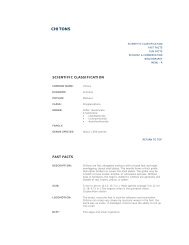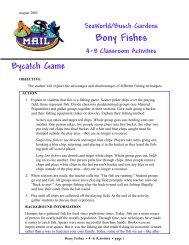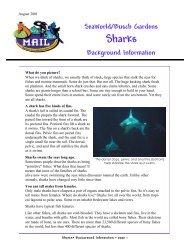Splash of Math 4–8 - Sea World
Splash of Math 4–8 - Sea World
Splash of Math 4–8 - Sea World
You also want an ePaper? Increase the reach of your titles
YUMPU automatically turns print PDFs into web optimized ePapers that Google loves.
<strong>Math</strong> is a part <strong>of</strong> our world.<br />
We encounter and use math every day.<br />
When we buy groceries, check the<br />
mileage on our car, or cook using a<br />
recipe, we are using math. When we lay<br />
brick for a patio, we use math. When we<br />
rearrange the furniture in our house, we<br />
use math. In fact, when faced with a<br />
problem, we <strong>of</strong>ten use math to help us<br />
approach and solve the problem.<br />
We use math at <strong>Sea</strong><strong>World</strong>.<br />
A laboratory technologist analyzing<br />
whale blood uses math to help estimate<br />
red blood cell count. A business analyst<br />
uses math to forecast daily attendance<br />
for next year. A food service manager<br />
uses math to determine food prices. An<br />
animal care specialist uses math to chart<br />
a dolphin calf’s growth. A water quality<br />
expert uses math to determine the<br />
amount <strong>of</strong> chlorine to add to the water<br />
in Shamu Stadium. An education<br />
department receptionist uses math to<br />
schedule school groups for field trips.<br />
Exhibit designers use math to help them<br />
design and build a new whale pool.<br />
<strong>Math</strong> is simply part <strong>of</strong> our daily work.<br />
A clear understanding <strong>of</strong> math concepts<br />
and experience using math skills are<br />
important to do almost every job<br />
at <strong>Sea</strong><strong>World</strong>.<br />
Students must become mathematical<br />
problem solvers.<br />
The idea that math is for people with<br />
special talents is a myth, as is the idea<br />
that some people “can’t do math.” In<br />
our society, everyone needs a useful<br />
knowledge <strong>of</strong> mathematics. A working<br />
knowledge <strong>of</strong> math prepares us not just<br />
for science and technical careers, but for<br />
a lifetime <strong>of</strong> analytical problem-solving.<br />
A <strong>Splash</strong> <strong>of</strong> <strong>Math</strong><br />
<strong>Splash</strong> <strong>of</strong> <strong>Math</strong> <strong>4–8</strong><br />
A <strong>Sea</strong><strong>World</strong> animal care specialist bottlefeeds<br />
rescued sea lion pups. Stranded<br />
animals are <strong>of</strong>ten dehydrated, and their<br />
weights are below normal. Weighing them<br />
regularly helps to assess their recovery.<br />
Students must be able to solve problems<br />
on a daily basis and to apply mathematics<br />
to the real world.<br />
<strong>Math</strong> skills help us solve routine<br />
problems readily. They also help us<br />
find ways to reach a solution when no<br />
routine path is obvious. <strong>Math</strong> skills<br />
help us to communicate logically and<br />
precisely about relationships, quantities,<br />
processes, and cause and effect. <strong>Math</strong><br />
skills also help us gather information,<br />
analyze evidence, and make connections<br />
among ideas and between mathematics<br />
and other disciplines.<br />
©2004 <strong>Sea</strong> <strong>World</strong>, Inc. 3




